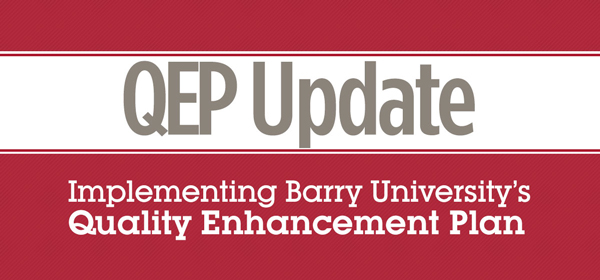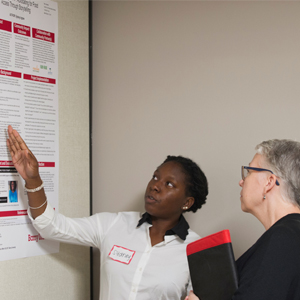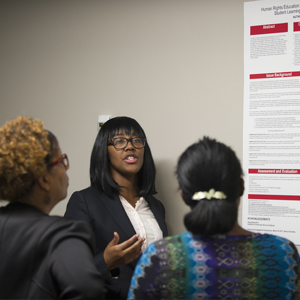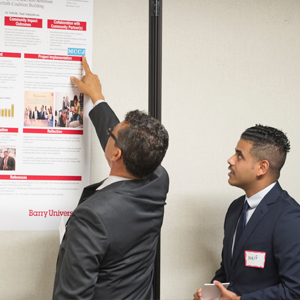|
|

|
Faculty Prepare to Integrate Personal and Social Responsibility Outcomes into Courses for Next Academic YearTwenty-three faculty and staff members participated in a recent Faculty Development Workshop focused on personal and social responsibility as student learning outcomes. Topics covered during the workshop included “Backwards Design: A Critical Look at Outcomes, Topics, and Assignments”; “Writing Academic Discourse”; “Experiential (Critical) Teaching and Learning”; and “Active Learning in the Classroom.” The two-day workshop was designed to prepare faculty to integrate personal and social responsibility outcomes into various courses for the 2017–2018 academic year. The QEP (Quality Enhancement Plan) Implementation Committee hosted the workshop on May 8 and 9. “Participants included faculty teaching undergraduate courses that satisfy general education distribution and major-area requirements, which can be added to the QEP curriculum,” noted Dr. Karen Callaghan, chair of the committee. “The workshop format was interactive, and faculty members were engaged throughout.” In addition to Callaghan, the workshop facilitators were Dr. Tamara Hamilton, associate professor of chemistry; Dr. Kathryn Comer, assistant professor of English; Dr. Glenn Bowen, director of the QEP; and Liz James, experiential learning coordinator. The workshop participants were as follows: Drs. Laura Alonso-Gallo, Beatriz Calvo-Peña, Nichole Castater, George Cvejanovich, Olena Drozd, Luigi Esposito, George Fisher, Sean Foreman, Pamela Hall, Ana Jimenez, Peter Lin, Hugh Murphy, Katherine Nelson, Jorge Presmanes, Victor Romano, Leticia Vega, and Sanja Zivanovic, as well as Isabel Benavides. |
Vice Provost, Director Make Rounds to Promote QEPVice Provost Dr. Christopher “Kit” Starratt and QEP Director Dr. Glenn Bowen made the rounds in February and March, promoting the QEP among Division of Academic Affairs administrators and faculty. Starratt and Bowen discussed the QEP with the School of Education Faculty Council on Feb. 24, Social Work School Council on Feb. 27, School of Business faculty and administrators on March 13, and associate deans and directors in the College of Nursing and Health Sciences on March 22. The discussions covered such matters as the assessment of student learning outcomes, the selection of major-area courses to be considered for the PSR (personal and social responsibility) designation, and the inclusion of designated service-learning courses as PSR courses. QEP Implementation Committee members attending the meeting in their school were Drs. Sean Buckreis (Education), Joanne Whelley and Jennifer Williams (Social Work), and Nichole Castater (Business). Starratt and Bowen also met with administrators in the Division of Mission and Student Engagement. Dr. Maria Alvarez and Larry Perez, members of the QEP Implementation Committee, participated in the March 20 meeting with Vice President Dr. Scott Smith and Associate VP Dr. Roxanne Davies. Much of the focus of the meeting was on Freshmen Experience Day. Starting next academic year, the administration of a student survey pretest as part of the QEP/PSR assessment will take place on Freshmen Experience Day. |
New Member for Community Advisory CommitteeProvost Dr. John Murray has appointed Heather Burdick, program director at MCCJ, to the Community Advisory Committee. Founded in 1935 as the Miami branch of the National Conference of Christians and Jews, MCCJ seeks “to advance understanding and respect among people of all cultures, religions and races, through advocacy, education, dialogue and conflict resolution.” Burdick (BA in Education) is a former teacher and the juvenile justice chairperson for the Greater Miami Chapter of the ACLU (American Civil Liberties Union) of Florida. She replaces Sister Michelle Fernandez, principal of St. Mary’s Cathedral School. The nine-member Community Advisory Committee supports the implementation of Barry’s Quality Enhancement Plan. |

|
Students Showcase Social Justice Efforts at SymposiumStudents presented 19 posters during a session of Barry University’s fourth annual Community Engagement Symposium on March 29. Several posters were designed to showcase students’ efforts to promote social justice in the community. The social justice-focused posters included “Building Awareness about Injustices within the Industrial Agricultural System” by Paris Razor (English); “Creating Opportunities for Barry Students to Combat the School-to-Prison Pipeline” by Akil Andrews (Communication) and Autumn Baker Peat (Sport and Exercise Science); and “Voices of the Future: Connecting with Urban Youth for Positive Life Directions” by Seretse Davis and Rajon Wright (Computer Information Science). Also among the notable posters on social justice-related topics were social work student Jennifer Sanhou’s “Welcoming Newcomers: Identifying Community Resources for Newly Resettled African Refugees” and criminology student Felix Vega Pagan’s “Understanding Police and Community Perspectives through Restorative Justice Circles.”
The other posters and presenters (including faculty members) were listed as follows:
The poster session was one of seven sessions of the Community Engagement Symposium. QEP Experiential Learning Coordinator Liz James coordinated the poster session. |
CCSI Seeks Suggestions for 2017–2018 Deliberative Dialogue TopicsThe Center for Community Service Initiatives (CCSI) is seeking suggestions for topics to be considered for its 2017–2018 Deliberative Dialogue Series. Deliberative Dialogue is one of nine co-curricular events that the QEP Implementation Committee has designated as “PSR.” Co-curricular programs, projects, and events that carry the PSR are geared to achieve at least one of the six personal and social responsibility outcomes of the QEP. The outcomes are categorized as (1) Ethical and Moral Reasoning, (2) Engaging Diverse Perspectives, and (3) Community Engagement and Collaboration. Each category contains two specific student learning outcomes. Deliberative Dialogue is a series of facilitated forums eliciting “voices and views from campus and community.” Students, alumni, faculty, staff, and community partners take part in the forums, working toward a shared understanding of specific social issues and practical solutions to those issues. The forums fulfill three student learning outcomes — two in the “Engaging Diverse Perspective” category and the third in “Community Engagement and Collaboration.” Suggestions for Deliberative Dialogue topics should be sent to CCSI Associate Director Courtney Berrien at cberrien@barry.edu. |

|
Frequently Asked Questions Answered at QEP WebsiteFrom “What is a Quality Enhancement Plan?” to “Whom should I contact if I need more information about the QEP?” — these are frequently asked questions (FAQ) answered at the QEP website. In all, 17 questions are answered in the FAQ section of the website. The following questions are also on the list:
For answers to other questions, contact QEP Director Dr. Glenn Bowen at gbowen@barry.edu. |
|
If you wish to unsubscribe or update your email subscription, please visit our email preference center. ©2017 Barry University. All Rights Reserved. |




